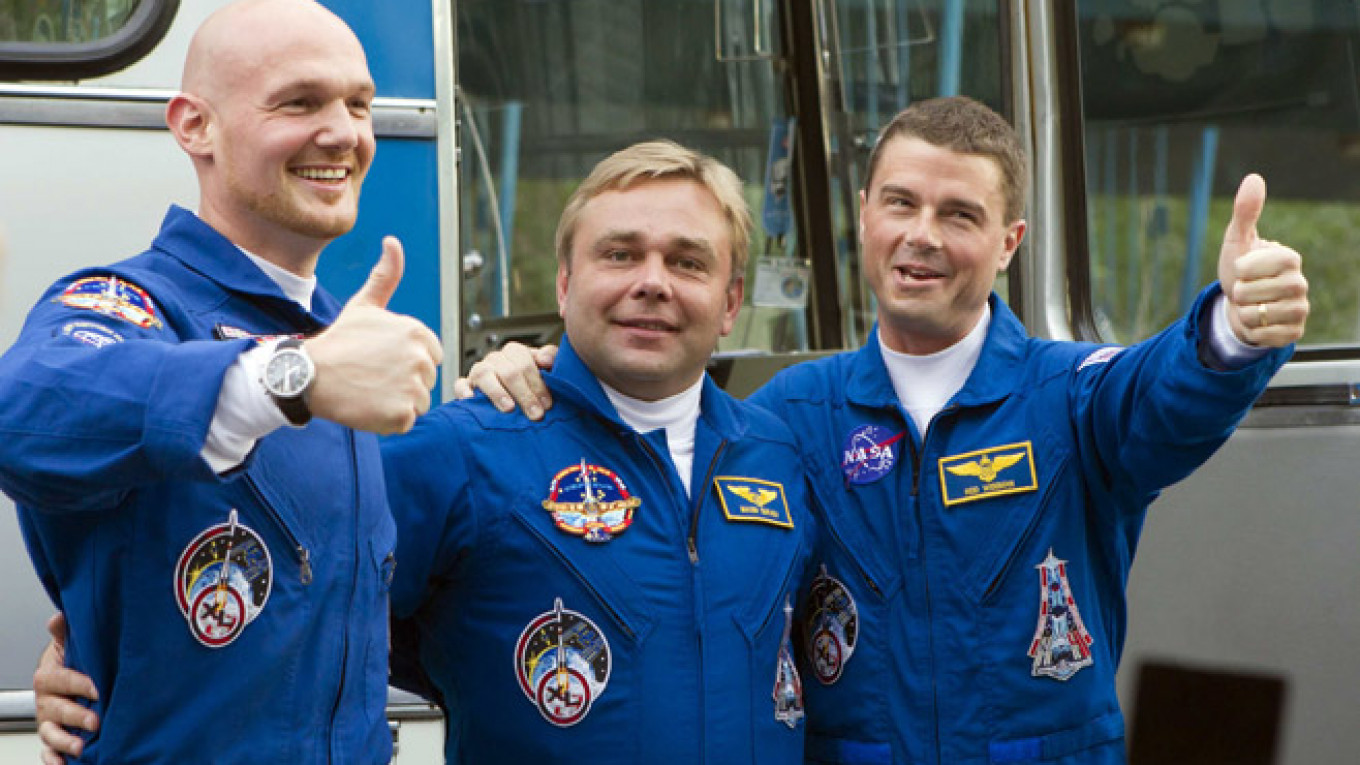U.S. cooperation with the Russian space program after the fall of the Soviet Union was pragmatic, not just political, a lesson that both countries should remember as ties fray over events in Ukraine.
Political reasons, certainly, were important to early space cooperation. Washington at the time wanted to fully integrate its former adversary into the Western world, while Russia was eager to join the West. With Russia experiencing an economic crisis following the collapse of the Soviet Union, Washington also saw the space program as a way to prevent missile technology and high-tech military know-how spreading around the world.
Pragmatic considerations, though, were also at play. Washington hoped to learn from Russia's expertise in long-term manned orbital missions and to purchase Russian rocket engines and equipment for interplanetary research stations. Russia, in turn, saw cooperation with the West as a way to enter the aerospace industry on the global market.
Of course, neither Russia nor the U.S. managed to fully achieve their respective goals during their two decades of cooperation. U.S.-Russian relations were complicated by a number of political issues, which proved a barrier to reaching a mutual understanding on space issues.
But the breaking point came with the crisis in Ukraine and Russia's annexation of Crimea this spring, ending any chance that the existing model of cooperation would continue.
From this point forward, U.S.-Russian cooperation in space might unfold according to several different scenarios.
The first is an "optimistic scenario," in which companies and governments collaborate on aerospace projects for their own mutual economic and scientific benefit.
Some companies are already forging ahead with their own aerospace plans. Google, for instance, plans to use solar-powered drone aircraft controlled via satellite to deliver wireless Internet to every far-flung corner of the planet. Companies owned by Elon Musk, Richard Branson, Robert Bigelow and others are ushering in the era of private space exploration. In this "brave new world," private companies will increasingly compete and cooperate in search of greater profits through space flight.
The state's role in spaceflight is also changing. Now its main tasks will involve creating favorable conditions for the development of space companies, investing in space-related research, and maintaining space infrastructure serving the good of the global community in such areas as navigation and meteorology.
Obviously, Russia has yet to become a heavyweight like the U.S. is in these areas, and so it needs to bring something to the table that will motivate Washington to accept it as a partner.
For example, Russia could choose to drop the idea that GLONASS should compete with the GPS navigation system. In the new world, satellite-based navigation systems can only complement, not replace each other. U.S. and Russian companies will have to consider how a single device could combine signals from U.S., Russian, European and Chinese navigational systems for everyday use.
In this optimistic scenario, Russia and the U.S. would team up for bilateral as well as multilateral research projects. The scale and complexity of those projects would compare to the Large Hadron Collider, only they would take place in space.
In effect, such joint research projects enable each participant to obtain the maximum results at the lowest cost. The newly acquired knowledge may even translate into greater quality of life and national development.
Second, there is the "realistic scenario," based on political considerations. No political regime lasts forever and Russia's new leadership, when it eventually rises to power, might be more interested than the current government in cooperating with the West.
The extent of that cooperation will not compare to previous levels, but in the event a new leadership does come to power in Moscow, Washington might offer an olive branch by teaming up with Russia on a series of small space projects that are both symbolic and of practical benefit.
By that time, though, the rundown state of Russia's space industry and the conservative approach to reforming it that dominates government circles will prevent this country from rapidly returning to the forefront of space research and technology.
That means Russia will have to make cuts to its space exploration program and pare down its priorities. If U.S.-Russian relations improve, Moscow could synchronize its priorities with the goals of the more robust U.S. space program in order to continue cooperating in a few specific areas.
In any case, the "realistic scenario" will likely see pragmatic considerations in Moscow and Washington coupled with Russia's extremely limited economic possibilities playing the deciding role in determining how energetically bilateral cooperation in space will be sought.
Third is the "worst-case scenario" dominated by inertia and disinterest. The U.S. and Russia, after all, are not under any obligation to cooperate in space. Bilateral efforts might hit a dead end in which Moscow becomes preoccupied with its own internal problems and Washington becomes less interested in collaborating with Russia on projects of mutual interest.
The International Space Station will continue to orbit the Earth as long as consortium members fund it and find it useful for research purposes. The past levels of cooperation will gradually peter out, though, under the weight of political inertia and the consequences of Western sanctions on both sides willingness to cooperate with the other.
Strangely, it is possible that this state of affairs might satisfy both parties, especially if Russia becomes absorbed with the ideas of absolute sovereignty and self-reliance that its leaders have recently espoused.
However, I have serious doubts that anything but full-fledged cooperation in space will advance the long-term interests of the Russian people.
Pavel Luzin is a scholar at the Institute of World Economy and International Relations.
A Message from The Moscow Times:
Dear readers,
We are facing unprecedented challenges. Russia's Prosecutor General's Office has designated The Moscow Times as an "undesirable" organization, criminalizing our work and putting our staff at risk of prosecution. This follows our earlier unjust labeling as a "foreign agent."
These actions are direct attempts to silence independent journalism in Russia. The authorities claim our work "discredits the decisions of the Russian leadership." We see things differently: we strive to provide accurate, unbiased reporting on Russia.
We, the journalists of The Moscow Times, refuse to be silenced. But to continue our work, we need your help.
Your support, no matter how small, makes a world of difference. If you can, please support us monthly starting from just $2. It's quick to set up, and every contribution makes a significant impact.
By supporting The Moscow Times, you're defending open, independent journalism in the face of repression. Thank you for standing with us.
Remind me later.








